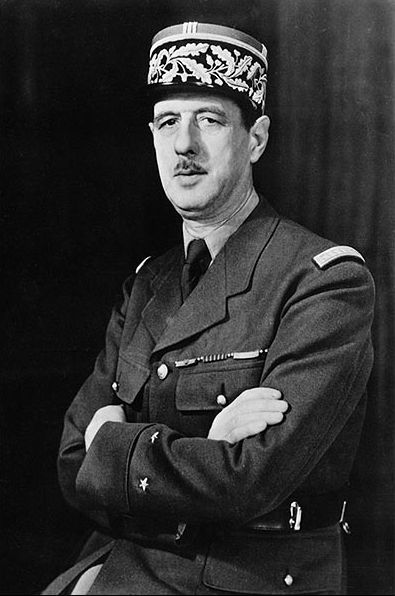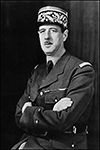Men of the Maquis are Striking for France!
The War Illustrated, Volume 8, No. 185, Page 150, July 21, 1944.
A special communiqué issued on June 17, 1944, by Supreme Headquarters of the Allied Expeditionary Force detailed the considerable part that has been – and now more than ever is being – played by the Maquis, the secret Army of the French Forces of the Interior, towards the liberation of their country. Just who these valiant patriots are is explained by JOHN ENGLAND.
"Guerilla operations against the enemy are in full swing", announced a communiqué from S.H.A.E.F., "and in some areas the army of the French Forces of the Interior are in full control. At the end of the first week of operations on the shores of France the army of the French Forces of the Interior has, with its British and American comrades, played its assigned role in the battle of liberation."
Let us turn back the clock to 1943, when Germany made forced labour absolute for young Frenchmen. Resistance at once stiffened and "ne va pas an Allemagne" (don't go to Germany) became the watchword. That followed the census of all men born between 1912 and 1921, about 130,000 being affected, according to Vichy, of the total of nearly a million registered for forced labour. Before then men could only be persuaded to go to work for the enemy; the Compulsory Labour Service instituted a two-year period. The Maquis (a Corsican word for the dense undergrowth of that island) was the reply of French youth to that.
No less than 200,000 young men dodged registration. In the Limoges region only forty per cent registered. Chambery did not supply one man. In Savoy 800 registered, but of those called up seventy-five per cent escaped. They became refugees, outlaws, "hill men". They were the first men of the Maquis. In their heroic and seemingly hopeless resistance to the all-powerful and all-pervading Nazis, there was something sublime – and futile, or so it seemed then. It is not possible to state with certainty the total number of young Frenchmen in the Maquis today; estimates range up to 500,000.
Faced with this dramatic recoil from the Nazi tyranny, Vichy tried many methods of persuading these patriots to submit to the foreign yoke. Promises were made of amnesty. When this failed force was brought to bear, in particular against the numerous bands who had retired to the Haute Savoie, there to wage a guerilla war against the invader, without organized arms, without proper commissariat, without camps, often without food or shelter.
It was to the Haute Savoie that the ruthless Darnand sent his armed police, but without much success, and soon there were bands of these spirited young men in every "inaccessible" part of France. These youths suffered many losses on the snow-covered mountains of the Mediterranean, and Darnand claimed that he had cleaned up the menace. It was an empty brag, for the men of the Maquis are more active than ever – in the Savoy, the Limousin, the Dijonnais and the Ardennes. They are in Brittany and in the Jura, they have strongholds even in Toulon and Bordeaux regions and in the Pyrenees.
The Maquis bar no foreigner who cares to join their ranks, and many have, including Fascist-hating Italians and Republican Spaniards. It includes radicals, socialists, communists, and royalists, too. Right, Left, Reds, Pinks and Blues, it is all the same. In the matter of leaders the Maquis have been fortunate, for many officers rallied to them, most notable of all General de Lattré de Tassigny, who later escaped from France and was in command of the French army which captured Elba in June 1944. Every man who makes his way to the hills or to the forests and is ushered into the hut or tent of the local captain must take an oath of fidelity, expecting no rewards, uniform or medals; only hardship, danger, outlawry, hunger and thirst.
The Maquis had in the early days only one source of firearms – setting aside secret stores which date back to the defeat of 1940; they had to carry out raids, and some of these have been spectacular in their daring. And it is a capital offence to lose one's arms, a severity dictated by the extremes of necessity. A man instructed to secure food or clothing sets forth from the secret camp for the nearest town or police or military store; often food and goods are pressed upon him without demand for payment. The peasants, too, have been a source of strength to the movement, hiding men and secreting food for them.
The Maquis waged war by means of sabotage, and as the months passed became more and more daring. Referring to them in a speech some time ago, General de Gaulle said, "We can guarantee that inside France combatants, many of whom are now taking part in small-scale actions, will participate in the great military effort of the French and the Allied armies by attacking the enemy in the rear on orders from the French command in accordance with the operational plans of the inter-allied High Command."
And now? Since D-Day (June 6, 1944) the ranks of the Maquis have continued to swell, absorbing police and gendarme and Vichy army deserters complete with their arms. On that day the French Provisional Government in Algiers announced that members of this underground movement were helping Allied airborne troops and attacking communications leading to the battle zone. It was further stated, on June 14, that the organization was recognized by the French Provisional Government and that all troops served under the orders of responsible leaders. Their official status as the French Army of the Interior was further marked on June 25 by the announcement that General Koenig, of Bir Hakeim fame, had been appointed to direct the operations of all resistance forces in France under and by authority of the Allied C.-in-C.
On D-Day an appeal was made by Supreme Command H.Q. to the Maquis asking them to try to delay enemy reinforcements being brought up to the Normandy coast during the first twelve hours of the Allied invasion. The reinforcements were delayed three and a half days! With almost fiendish energy the partisans are paralysing rail and road traffic, destroying bridges, damaging canals and locks, and interrupting telegraph and telephone communications.
Subterranean cables, in spite of being well defended, have been attacked and destroyed, and transformer stations have been the objective of well-directed and executed sabotage. German garrisons have been harried, street fighting has occurred, villages occupied, enemy detachments wiped out, and prisoners taken. And still it is rising – this enemy-dreaded might of the Maquis; a grim shadow of doom behind the German lines.
Index
Previous article
Streets as Battlefields and Towns as Forts
Towns defended with determination can most effectively hold up a modern army – a lesson slowly and painfully learnt by ourselves and the enemy during the course of this war. New methods of attack ar
Next article
Our Colonies in the War: No. 11 - The Cameroons
Remembering the days of Teuton misrule that part of the Cameroons which became British after the Germans were defeated there in February 1916 is helping to ensure another defeat for the enemy. Lying b





